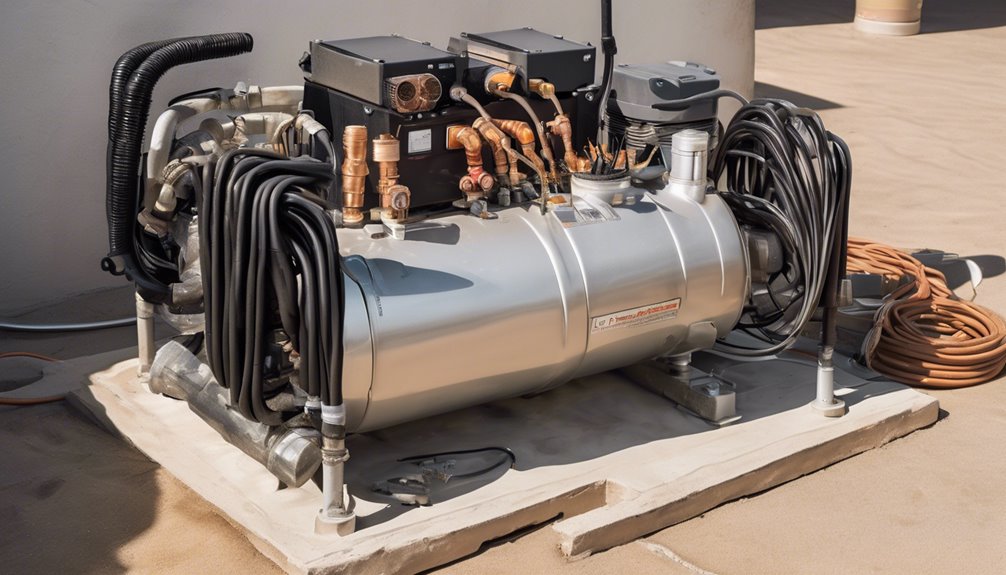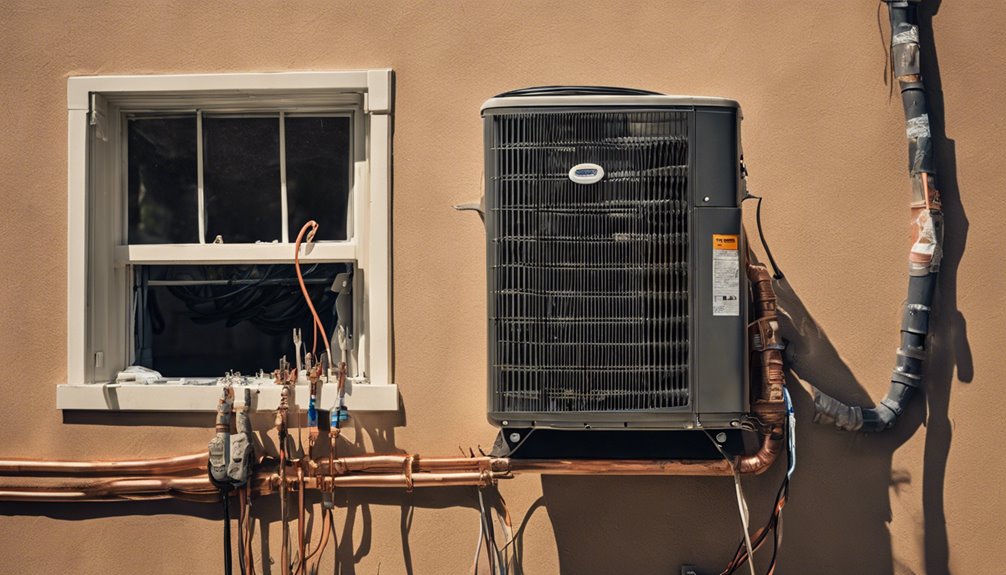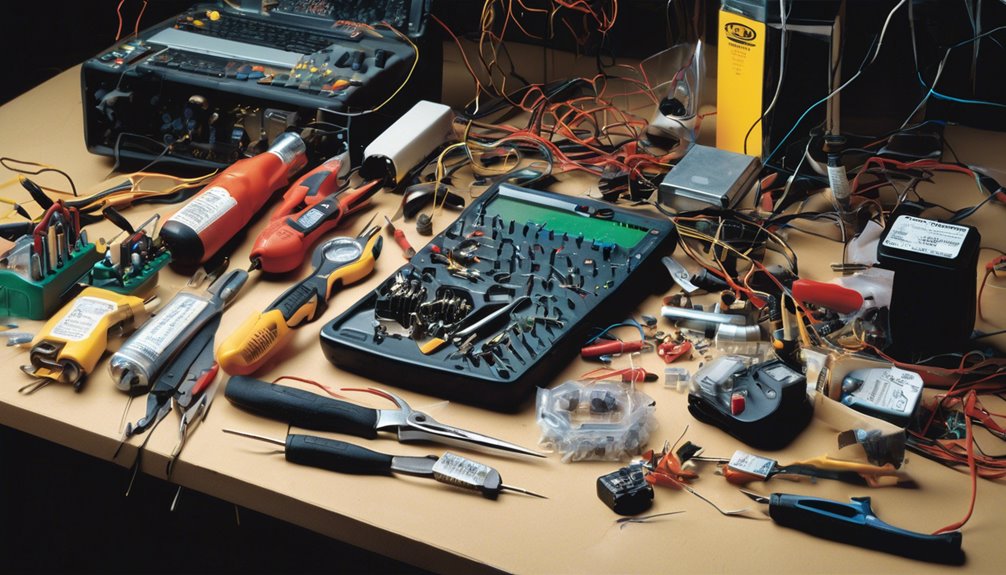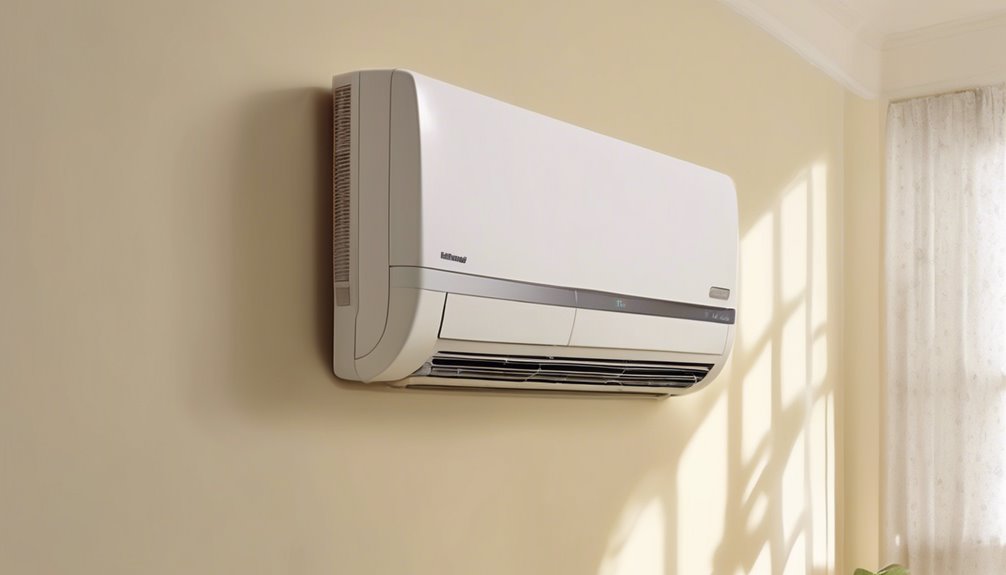When your AC compressor fails to turn on, you're likely dealing with a deeper issue. Check if the circuit breaker has tripped or a fuse has blown, as power issues can prevent the compressor from getting the power it needs. Faulty thermostats, refrigerant leaks, or worn compressor components could also be the culprit. If you're not sure where to start, don't worry – we'll guide you through the possible causes and help you get your AC up and running again.
Key Takeaways
- Check the circuit breaker or fuse box to ensure the breaker hasn't tripped or a fuse hasn't blown due to power issues.
- Inspect the thermostat and sensors for faults, miscalibration, or sticking, which can prevent the compressor from turning.
- Look for refrigerant leaks and low pressure, which can be identified by hissing sounds or ice buildup, and inspect coils for damage or corrosion.
- Verify the capacitor's rating, condition, and connections, as a faulty capacitor can prevent the compressor from turning.
- Ensure air filters and coils are clean, and vents are unobstructed, as clogged components can cause the compressor to fail.
Power Issues and Tripped Breakers
If your AC compressor isn't turning, it's likely due to a power issue.
You might be dealing with voltage drops, which can prevent the compressor from getting the power it needs to function. Electrical surges can also cause the compressor to shut down as a safety precaution.
Voltage drops and electrical surges can prevent the compressor from functioning, triggering a safety shutdown.
Check your circuit breaker or fuse box to see if the breaker has tripped or a fuse has blown. If so, reset the breaker or replace the fuse. Make sure the compressor is receiving the correct voltage and that there are no other electrical issues in your home.
If the problem persists, it's best to consult a professional electrician to diagnose and fix the issue.
Faulty Thermostats and Sensors
You're likely familiar with the importance of thermostats and sensors in your AC system, but when they fail, your compressor won't turn.
You'll notice symptoms like inconsistent cooling, erratic temperature readings, or a complete system shutdown.
Now, let's explore the common causes of sensor malfunctions and thermostat failures that might be behind your compressor's refusal to turn.
Thermostat Failure Symptoms
What's causing your AC compressor to malfunction could be a faulty thermostat or sensor.
If your thermostat is miscalibrated, it can't accurately sense the room temperature, leading to temperature fluctuations. You might notice your AC compressor turning on and off rapidly, or not turning on at all.
In some cases, the thermostat may be stuck, causing the compressor to run continuously or not run at all. Check your thermostat's calibration to ensure it's set correctly.
If you're still experiencing issues, it's possible the thermostat itself is faulty and needs to be replaced. Pay attention to any unusual temperature fluctuations, as they can indicate a thermostat failure.
Sensor Malfunction Causes
A faulty thermostat or sensor can trigger a range of sensor malfunctions that prevent your AC compressor from turning.
You might be wondering what's causing the issue. Well, it's often due to faulty wiring, incorrect calibration, or other sensor-related problems.
- Faulty wiring can disrupt the sensor's ability to send signals to the compressor, preventing it from turning on.
- Incorrect calibration can lead to false readings, causing the compressor to malfunction or not turn on at all.
- Additionally, physical damage to the sensor or thermostat can also prevent the compressor from receiving the necessary signals to operate.
Refrigerant Leaks and Low Pressure
You're now going to investigate another common cause of a non-turning AC compressor: refrigerant leaks and low pressure.
If you suspect a refrigerant leak, you'll need to detect it and pinpoint its source to fix the issue.
Low pressure symptoms, such as a hissing sound or ice buildup, can also indicate a leak or other problem.
Refrigerant Leak Detection
Refrigerant leaks can be a major culprit behind your AC compressor's refusal to turn.
If you suspect a leak, you'll need to detect it to fix the issue. You can use specialized tools like refrigerant sniffers or leak detectors to identify the source of the leak. These devices can detect even the slightest refrigerant presence, making it easier to pinpoint the problem.
- Check the compressor's suction and discharge lines for signs of refrigerant leakage.
- Inspect the condenser coils and evaporator coils for any signs of damage or corrosion.
- Look for oil spots or stains near connections, valves, or other system components.
Low Pressure Symptoms
Low pressure in your air conditioner's system is often a telltale sign of refrigerant leaks or other issues. If you're experiencing low pressure, it's essential to perform system checks to identify the root cause. One of the most critical tools for this process is a pressure gauge, which helps you measure the pressure levels in your system.
| Symptom | Cause | Solution |
|---|---|---|
| Low pressure reading | Refrigerant leak | Inspect and repair/replace affected components |
| Inconsistent cooling | Insufficient refrigerant | Recharge system with recommended refrigerant type/amount |
| Compressor failure | Low pressure due to leak | Replace compressor and repair/replace affected components |
Capacitor Problems and Electrical Issues
When your AC compressor fails to turn, it's essential to inspect the capacitor, a critical component that provides the necessary power to operate the compressor and fan motors.
A faulty capacitor can prevent your AC from functioning properly. You should check for signs of capacitor corrosion, which can occur due to electrical surges or moisture exposure.
- Look for rust, corrosion, or burn marks on the capacitor.
- Check the capacitor's terminals for loose connections or signs of wear.
- Verify the capacitor's rating matches the compressor's requirements.
Clogged Air Filters and Coils
Clogged air filters and coils can silently sabotage your air conditioner's performance, causing the compressor to fail.
Clogged air filters and coils can silently sabotage your air conditioner's performance, leading to costly compressor failure.
You mightn't notice anything's wrong until your AC unit stops working altogether. Dirty vents and blocked airflow are often the culprits behind compressor failure.
When air filters become clogged, they restrict airflow, making your AC work harder to cool your space. This increased strain can lead to overheating, which can damage the compressor.
Similarly, dirty coils can cause the AC to malfunction, putting excessive pressure on the compressor.
Regular maintenance, such as cleaning or replacing air filters and coils, can prevent these issues and keep your AC running smoothly.
Don't let clogged air filters and coils catch you off guard – stay on top of maintenance to avoid compressor failure.
Worn or Faulty Compressor Components
Faulty compressor components can be the silent assassins of your air conditioner's performance, gradually decreasing its efficiency until it finally gives up.
You mightn't notice anything at first, but worn or faulty parts can lead to a complete breakdown.
Some common culprits include:
- Worn valves that can't regulate refrigerant flow properly
- Compressor bearings that are worn out or seized
- Electrical contacts that are corroded or damaged
If you suspect worn or faulty compressor components are the cause of your AC compressor not turning on, it's essential to have them inspected and replaced by a professional.
Ignoring the problem can lead to further damage and more costly repairs down the line.
Frequently Asked Questions
Can I Repair an AC Compressor Myself?
When tackling a faulty appliance, you're likely wondering if you can DIY the fix. While you might save on cost considerations, it's often wise to seek professional guidance to avoid further damage and ensure a safe, effective repair.
Will a Faulty Compressor Affect My Air Conditioner's Fan?
You're wondering if a faulty compressor will impact your air conditioner's fan. Yes, it can! A faulty compressor can cause fan motor failure or be triggered by an electrical surge impact, leading to a malfunctioning fan.
Can a Dirty Compressor Exterior Cause It to Malfunction?
You should clean your compressor's exterior regularly, as dirt accumulation can block airflows and cause it to overheat, leading to malfunctions or even breakdowns, so it's essential to keep it free from debris to ensure proper functioning.
Will a New Compressor Improve My Ac's Energy Efficiency?
You're wondering if a new compressor will boost your AC's energy efficiency. Yes, it can! A new compressor typically offers improved energy savings and increased cooling capacity, allowing your AC to run more efficiently and effectively.
Can I Reuse a Compressor From an Old Air Conditioner?
You're considering reusing a compressor from an old air conditioner, but you'll need to ensure it's compatible with your new system. Check the specs to guarantee seamless system integration, as mismatched components can lead to performance issues and energy efficiency losses.
Conclusion
You've checked all the possible causes for your AC compressor not turning on. If it's not a power issue, faulty thermostat, refrigerant leak, capacitor problem, clogged air filter, or worn compressor component, it's time to call a professional. Don't risk further damage or safety hazards. Get expert help to diagnose and fix the issue, and get your AC running smoothly again. Remember, a quick fix now can save you from costly repairs down the line.



